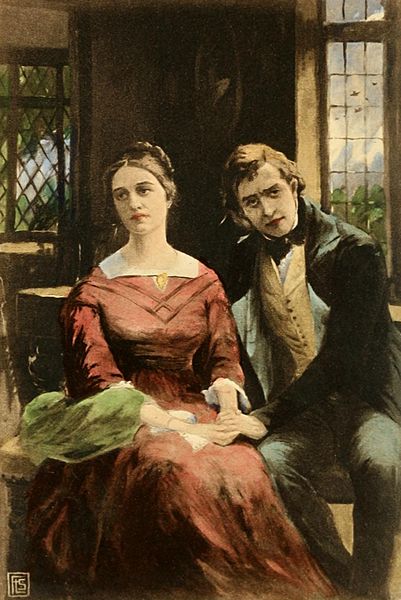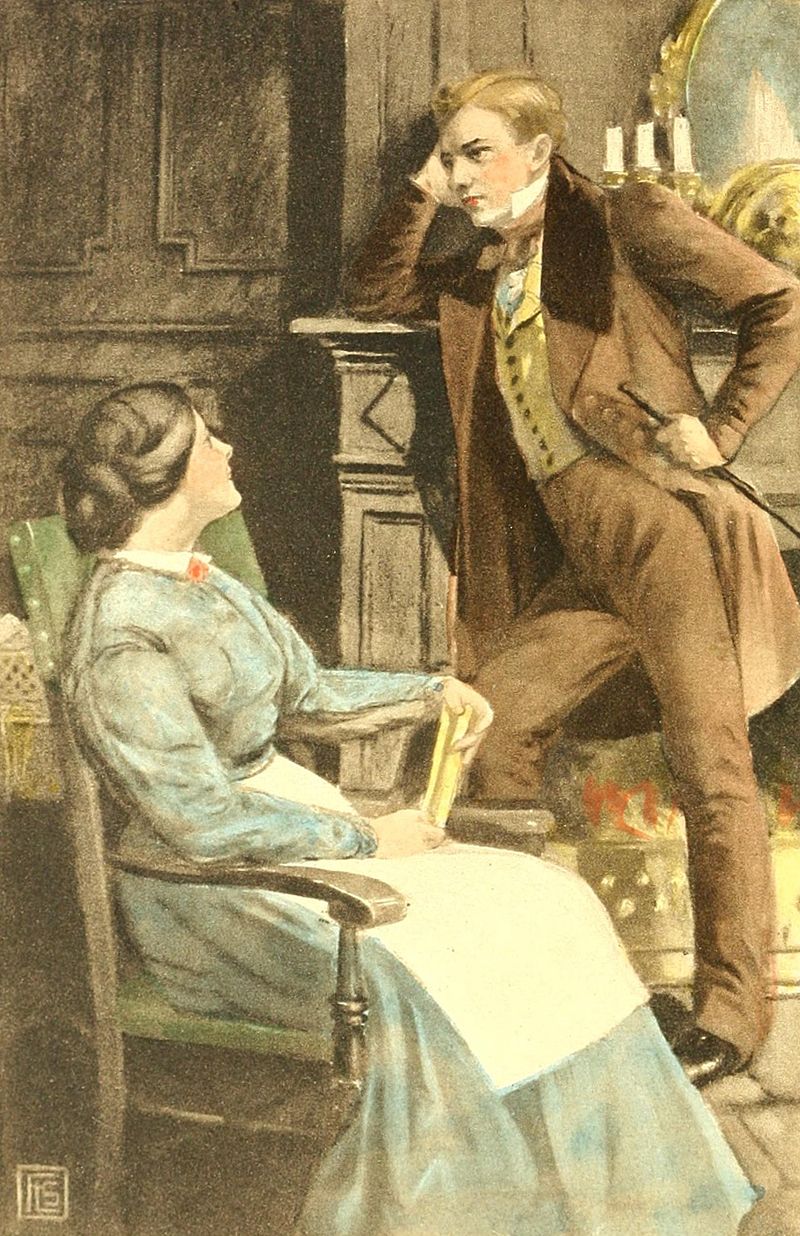Published in 1997, this book is actually a follow-up to Is Heathcliff a Murderer? Can Jane Eyre Be Happy offers a number of short essays on questions in classic fiction and their possible answers.
The title essay, Can Jane Eyre Be Happy? reveals that Bluebeard was a commonly collected fairy tale for children in the Victorian era. The author states that Jane Eyre contains several references to the Bluebeard tale and is a kind of re-telling of it. As a self-avowed vacuous reader of fiction, the questions raised here about Rochester's character and motivations, and Jane's future happiness, had never occurred to me before.
Sutherland's essay on Jane Eyre begins by noting that editor Margaret Smith, in her critical introduction to the Oxford University Press World Classics edition of the novel, correctly notes the influences of the Bible, Bunyan (author of The Pilgrim's Progress, less known today in this country although it is mentioned in Louisa May Alcott's Little Women), Shakespeare, Scott and Wordsworth. He goes on to note that an omission in her list is the tale of Bluebeard, a fairy tale retold by French fairy tale collector Perrault and well known to Victorian children. (Interestingly, Bluebeard did not appear in my Andrew Lang book or my Signet The Twelve Dancing Princesses.)
Bluebeard marries a young woman and when he has to go on a trip, he gives his wife the keys to the house and instructs not to enter a specific room. Curiosity gets the best of her and she enters the room only to discover the corpses of Bluebeard's former wives. Her husband returns and a drop of blood on the key for the forbidden room betrays the wife's secret. In mortal peril, the bride is saved by the arrival of her brothers, who kill Bluebeard.
Sutherland argues that the loss of Rochester's first wife Bertha in the fire at Thornfield Hall is convenient for him and even that the innkeeper's testimony that he saw Bertha fall is "clearly" a reiteration verbatim of his testimony at the coroner's inquest, with the implication that his role as a businessman in the community gives him a motive for exonerating Rochester. Sutherland asks why Rochester didn't commit his wife to one of the new, much more humane sanitariums then already in existence in England. He sees Grace Poole's alcoholism as impairment of her fitness for her role as keeper and as casting further doubt on Rochester's true motivations. He explains Blanche Ingram's visit as a sign that Rochester has determined to marry again despite the fact that it is bigamy and opines that Rochester's interest in Jane is due to a proposed match with Ingram being thwarted by the arrival of Bertha's brother.
Further, Sutherland sees Mrs. Fairfax's role as that of a wise protector of Jane, and her dismissal by Fairfax as evidence of his desire to hide his criminal intent to commit bigamy.
Given that Rochester may have murdered his first wife and Mrs. Fairfax is gone, is Jane Eyre safe with Rochester and likely to be happy? Sutherland mentions that Rochester is blinded by his accident during the fire and argues that his disability and reduced agency may transform him from bigamist to more suitablem or at least, less threatening, husband for Jane.
Sutherland concludes, "But what if, like Edward Rochester, after years of marriage, his sight were to return and -- barring the blemish of a missing hand (common enough, and even rather glamorous in these post-war years) -- Bluebeard still cut a handsome figure. Could one be entirely confident that his wife-killing way would not return?"
Sutherland's conclusion really surprised me because I had always thought of the story of Jane Eye as a woman's empowerment story: Jane is (eventually) able to marry the man she loves despite the fact that she is: plain, an orphan, and poor. Seeing Jane Eyre as a re-telling of the Blackbeard story turns my vision of the meaning of the Jane Eyre story on its head.
If this idea Jane Eyre as a retelling of the Blackbeard story intrigues you, you might enjoy reading this well-supported student essay on this theme: http://bit.ly/2hzbCfX.
There are a lot of other essays on favorite novels here: an essay on the vulgarity of Mrs. Elton in Emma, the paternity of Tom Jones in Tom Jones (it never occurred to me to wonder), how Mrs. Dalloway gets home so quickly from her excursion to get flowers the day of her party, the gender of Lady Bertram's pug in Mansfield Park, Tristram Shandy, Fanny Hill, The Mill on the Floss, Adam Bede, Barchester Towers, Hardy's A Pair of Blue Eyes (I'd never even heard of this).
Postscript: After I'd read this book, including its essay on Mill on the Floss which concludes that George Eliot was no sailor, I thought of that essay again when I was reading When We Were Yours.
There's an exciting scene where the houseboat of the family in the story is unmoored, drifts out on the river, and breaks up. I found it hard to follow the action, even though it was exciting, and it reminded me of this essay; I wondered if perhaps the fact that I am no sailor made it more difficult for me to understand.
The title essay, Can Jane Eyre Be Happy? reveals that Bluebeard was a commonly collected fairy tale for children in the Victorian era. The author states that Jane Eyre contains several references to the Bluebeard tale and is a kind of re-telling of it. As a self-avowed vacuous reader of fiction, the questions raised here about Rochester's character and motivations, and Jane's future happiness, had never occurred to me before.
Sutherland's essay on Jane Eyre begins by noting that editor Margaret Smith, in her critical introduction to the Oxford University Press World Classics edition of the novel, correctly notes the influences of the Bible, Bunyan (author of The Pilgrim's Progress, less known today in this country although it is mentioned in Louisa May Alcott's Little Women), Shakespeare, Scott and Wordsworth. He goes on to note that an omission in her list is the tale of Bluebeard, a fairy tale retold by French fairy tale collector Perrault and well known to Victorian children. (Interestingly, Bluebeard did not appear in my Andrew Lang book or my Signet The Twelve Dancing Princesses.)
Bluebeard marries a young woman and when he has to go on a trip, he gives his wife the keys to the house and instructs not to enter a specific room. Curiosity gets the best of her and she enters the room only to discover the corpses of Bluebeard's former wives. Her husband returns and a drop of blood on the key for the forbidden room betrays the wife's secret. In mortal peril, the bride is saved by the arrival of her brothers, who kill Bluebeard.
Sutherland argues that the loss of Rochester's first wife Bertha in the fire at Thornfield Hall is convenient for him and even that the innkeeper's testimony that he saw Bertha fall is "clearly" a reiteration verbatim of his testimony at the coroner's inquest, with the implication that his role as a businessman in the community gives him a motive for exonerating Rochester. Sutherland asks why Rochester didn't commit his wife to one of the new, much more humane sanitariums then already in existence in England. He sees Grace Poole's alcoholism as impairment of her fitness for her role as keeper and as casting further doubt on Rochester's true motivations. He explains Blanche Ingram's visit as a sign that Rochester has determined to marry again despite the fact that it is bigamy and opines that Rochester's interest in Jane is due to a proposed match with Ingram being thwarted by the arrival of Bertha's brother.
Further, Sutherland sees Mrs. Fairfax's role as that of a wise protector of Jane, and her dismissal by Fairfax as evidence of his desire to hide his criminal intent to commit bigamy.
Given that Rochester may have murdered his first wife and Mrs. Fairfax is gone, is Jane Eyre safe with Rochester and likely to be happy? Sutherland mentions that Rochester is blinded by his accident during the fire and argues that his disability and reduced agency may transform him from bigamist to more suitablem or at least, less threatening, husband for Jane.
Sutherland concludes, "But what if, like Edward Rochester, after years of marriage, his sight were to return and -- barring the blemish of a missing hand (common enough, and even rather glamorous in these post-war years) -- Bluebeard still cut a handsome figure. Could one be entirely confident that his wife-killing way would not return?"
Sutherland's conclusion really surprised me because I had always thought of the story of Jane Eye as a woman's empowerment story: Jane is (eventually) able to marry the man she loves despite the fact that she is: plain, an orphan, and poor. Seeing Jane Eyre as a re-telling of the Blackbeard story turns my vision of the meaning of the Jane Eyre story on its head.
If this idea Jane Eyre as a retelling of the Blackbeard story intrigues you, you might enjoy reading this well-supported student essay on this theme: http://bit.ly/2hzbCfX.
There are a lot of other essays on favorite novels here: an essay on the vulgarity of Mrs. Elton in Emma, the paternity of Tom Jones in Tom Jones (it never occurred to me to wonder), how Mrs. Dalloway gets home so quickly from her excursion to get flowers the day of her party, the gender of Lady Bertram's pug in Mansfield Park, Tristram Shandy, Fanny Hill, The Mill on the Floss, Adam Bede, Barchester Towers, Hardy's A Pair of Blue Eyes (I'd never even heard of this).
Postscript: After I'd read this book, including its essay on Mill on the Floss which concludes that George Eliot was no sailor, I thought of that essay again when I was reading When We Were Yours.
There's an exciting scene where the houseboat of the family in the story is unmoored, drifts out on the river, and breaks up. I found it hard to follow the action, even though it was exciting, and it reminded me of this essay; I wondered if perhaps the fact that I am no sailor made it more difficult for me to understand.



